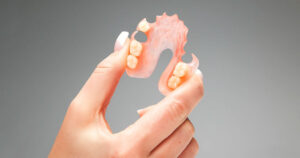Pain from dental implants may be concerning, especially if you are not sure what the expected pain should be and how to cope with the pain effectively. With dental implants, pain and some swelling are expected as the body heals from the surgery. However, knowing the right techniques for relieving pain from dental implants will greatly reduce the pain associated with the healing process from the surgery. In this article, you will be able to learn the right techniques for relieving dental implant pain without necessarily going to the dentist.
What Causes Dental Implant Pain After Surgery
Pain after the surgery is expected during the healing process as your body readjusts to the new implant installation in your mouth. However, the sources of pain may lie in the swelling of the gums, some traces of bruising, and the pressure the implant surgery puts on the jawbone during the process. In other cases, the sources might include infection of the implant, improper installation, and irritation of the nearby nerves in the mouth. In most cases, the pain will be eliminated naturally in a few days after the surgery as the body heals from the inflammation process around the implant installations.
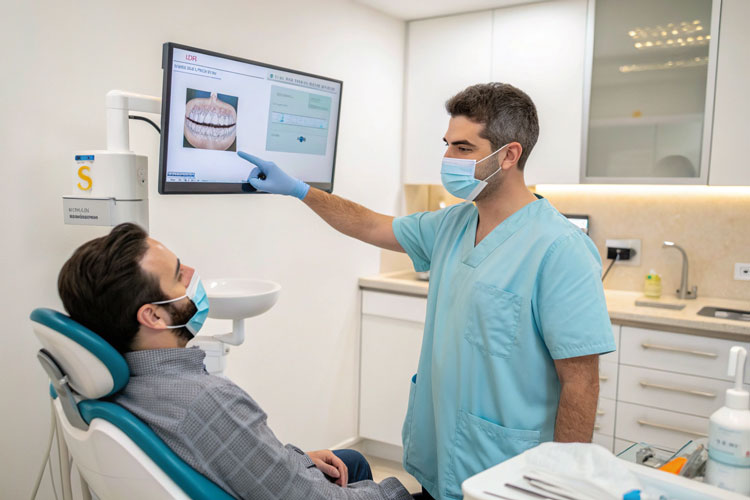

Book Your Consultation Now
How to Relieve Dental Implant Pain at Home
To relieve pain caused by dental implants, following the tips and recommendations below can be helpful:
1. Use Cold Compresses
A cold pack should be placed on the cheek where the implant was placed for a period of 10 to 15 minutes to reduce the swelling and relieve pain.
2. Take Over-the-Counter Pain Relievers
You could take medication such as Ibuprofen or Acetaminophen for the pain associated with dental implants.
3. Maintain Gentle Oral Hygiene
You should clean your mouth using a soft-bristle toothbrush and salt water to avoid infection and facilitate the healing process.
Related Article: Types of Dental Implants: Complete Patient Guide
4. Eat Soft Foods
Sticking to soups, mashed potatoes, smoothies, and yogurt will ensure that the body doesn’t exert pressure on the implant sites during the healing process.
5. Keep Your Head Elevated
Sleeping with the head elevated also ensures a smooth healing process by increasing the supply of blood to the area around the implant.
6. Avoid Smoking and Alcohol
Both of these habits may impair the healing process and cause infection, thus increasing the pain associated with dental implants.
7. Rest and Avoid Heavy Activity
Give your body time to heal by avoiding strenuous activity, which may disturb the implant placement within the mouth.
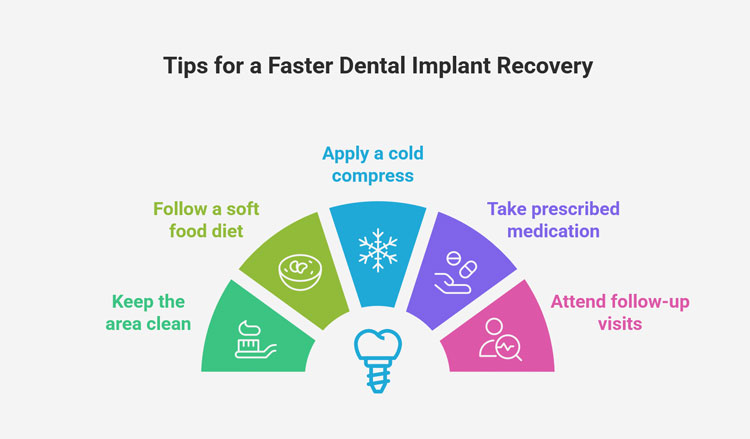
Tips for a Faster Dental Implant Recovery
A smooth recovery requires you to adhere to the dentist’s after-care advice and practice good daily hygiene. To facilitate a fast recovery and reduce pain associated with dental implants, you should ensure the area around the implant remains clean and irritation-free. You should avoid the temptation to touch the implant area with your fingers and/or tongue, for example. Additionally, staying hydrated and eating a well-balanced diet high in vitamins C and D is advised. Below are the must-follow tips during recovery and their advantages:
| Recovery Tip | Benefit |
| Keep the area clean | Prevents infection and promotes healing |
| Follow a soft food diet | Reduces pressure on the implant |
| Apply a cold compress | Controls swelling and pain |
| Take prescribed medication | Manages inflammation and discomfort |
| Attend follow-up visits | Ensures proper osseointegration and recovery progress |
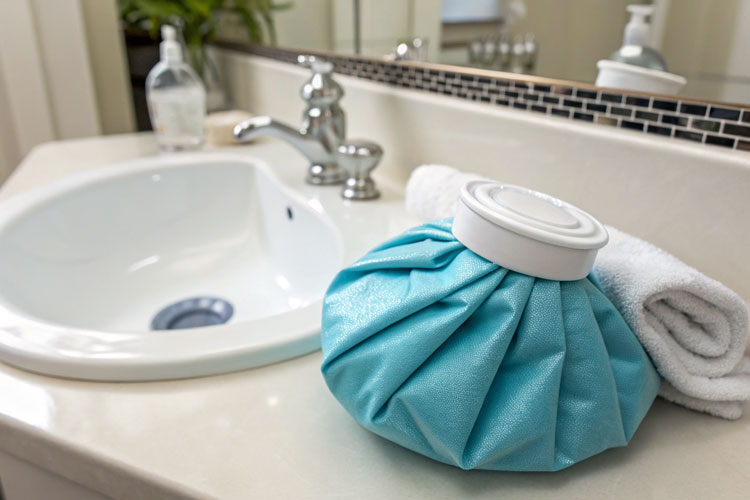
When to See Your Dentist About Persistent Pain
Though it may be normal to experience some pain after surgery, if the pain in the dental implants lingers or gets worse, this could be an indication of an issue arising from the surgery. You should consult your dentist if the pain lasts longer than a week, the swelling gets worse rather than shrinking, or if there is a discharge from the area where the implants are placed. Other signs may be having trouble chewing food, a sensation of looseness in the implants, and numbness around the jaw area.
If your discomfort results from tooth structure damage rather than the implant itself, restorative solutions, such as dental crowns, can restore full function and comfort.
Find Comfort and Relief from Dental Implant Pain
At Danforth Dentistry Clinic in Toronto, we provide expert care to relieve dental implant pain and ensure a smooth recovery. Trust our experienced team for personalized, comfortable treatment.
Foods That Help Reduce Dental Implant Pain Naturally
Eating the right foods will help the body heal and reduce the pain associated with dental implants. Foods high in antioxidants and Omega-3 fatty acids are effective in reducing the swelling associated with pain. Foods high in essential nutrients should be consumed during the recovery process of the dental implants.
Recommended foods include:
- Smoothies with berries and yogurt for vitamins and probiotics
- Mashed avocado for healthy fats that reduce inflammation
- Scrambled eggs for protein and easy digestion
- Oatmeal and soups for comfort and warmth
- Steamed vegetables for vitamins without hardness
Try to avoid spicy, crunchy, and hot foods until the gums are fully healed around the implanted area.
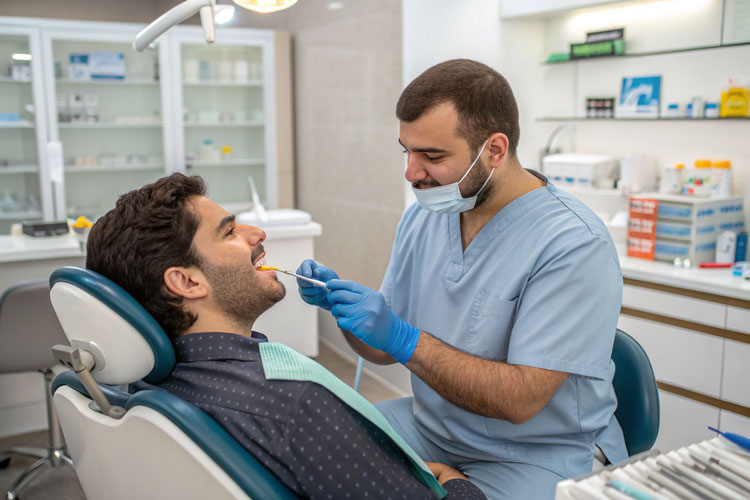
Get Expert Help for Dental Implant Pain Now
A certain level of pain associated with dental implants is expected during the healing process; however, this should resolve as your gums and jaw heal and acclimate to the new implants. By taking the advice of your dentist and eating soft foods, you are doing the simplest thing to aid the healing process and relieve pain associated with dental implants.
At the Danforth Dentistry Clinic in Toronto, we focus on dental implants as well as general dental care such as veneers, root canals, fillings, and orthodontics. Whether you are in pain from dental implants or seeking the best possible attention for optimal comfort, we are ready to serve you.
Related Article: Top 10 Dental Implant Brands in 2025
FAQ
-
How to stop dental implant pain?
Take over-the-counter pain medication, put ice on the affected area, consume soft foods, and do the dentist’s bidding to reduce the swelling and aid in the healing process.
-
How long does dental implant pain last?
In most cases, the pain associated with dental implants takes three to seven days to heal after the surgery. In the event the pain lingers after a week, consult the dentist for examination.
-
What helps with dental implant pain at night?
Sleeping with the head elevated, avoiding pressure on the side of the implant, and taking pain medication as directed by your dentist are recommended.
-
When should I worry about dental implant pain?
Seek dental care if the pain increases after a few days, if the swelling gets worse, or if you notice bleeding, fever, or drainage.
-
Can I prevent dental implant pain in the future?
Absolutely! By practicing good oral hygiene, adhering to regular dental checkups, refraining from smoking, and sticking to soft, nutritious diets after the surgery.
So, if you know how the pain of dental implants feels, then share your experience in the comments below and ask as many questions as you like; perhaps then you’ll be able to move past the pain and manage to feel comfortable again!




